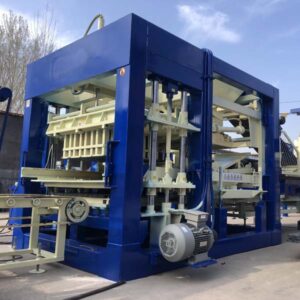
Title: **Elevating Full-Automatic Block Manufacturing: The Servitization Model Adoption**
Introduction:
In a landscape marked by evolving customer demands and technological advancements, the full-automatic block manufacturing industry is exploring innovative business models to provide more value to clients. Servitization, a shift from traditional product-centric models to service-oriented approaches, is gaining traction. This article delves into the adoption of the servitization model in full-automatic block manufacturing, elucidating how this transition enhances customer relationships, fosters sustainability, and drives business growth.
1. **Understanding Servitization:**
Servitization is a strategic shift wherein manufacturers evolve from merely selling products to providing comprehensive services and solutions. In the context of full-automatic block manufacturing, this entails offering not only the physical blocks but also a range of accompanying services that enhance the overall value proposition for customers.
2. **Integrated Maintenance and Support Services:**
As part of the servitization model, full-automatic block manufacturers can provide integrated maintenance and support services. This includes regular maintenance checks, predictive maintenance utilizing data analytics, and immediate support in case of any issues with the automated manufacturing machinery. By ensuring the continuous operation of equipment, manufacturers contribute to the longevity and efficiency of the full-automatic block production process.
3. **Performance Monitoring and Optimization:**
Servitization allows manufacturers to offer performance monitoring services, leveraging data analytics and IoT (Internet of Things) sensors embedded in the manufacturing equipment. Clients can benefit from real-time insights into the operational performance of their full-automatic block machines. Manufacturers can then offer recommendations for optimization, energy efficiency improvements, and other enhancements based on the data collected.
4. **Training and Skill Development Programs:**
Under the servitization model, manufacturers can provide training and skill development programs for the operators and maintenance personnel involved in full-automatic block production. This ensures that the client’s workforce is proficient in handling and maintaining the machinery, reducing the likelihood of downtime and enhancing overall operational efficiency.
5. **Blockchain-Enabled Transparency Services:**
Integrating blockchain technology into the servitization model enhances transparency in the full-automatic block manufacturing process. Clients can benefit from a blockchain-enabled ledger that tracks every stage of block production, from raw material sourcing to the final product. This transparency builds trust and confidence among clients, assuring them of the quality and sustainability of the manufacturing process.
6. **Customization Services and Product Upgrades:**
Servitization allows manufacturers to offer customization services to clients, tailoring full-automatic block products to meet specific project requirements. Additionally, manufacturers can provide regular product upgrades, ensuring that clients have access to the latest technological advancements in block manufacturing. This approach fosters long-term relationships and customer loyalty.
7. **Circular Economy Initiatives:**
Embracing a servitization model aligns with circular economy principles, emphasizing resource efficiency and waste reduction. Manufacturers can implement take-back programs, where old blocks are recycled and reused in the manufacturing process. This not only contributes to environmental sustainability but also positions the manufacturer as a responsible and eco-conscious partner.
8. **Outcome-Based Contracts:**
Servitization often involves a shift towards outcome-based contracts, where clients pay for the results or outcomes achieved rather than the products or services provided. Full-automatic block manufacturers can offer outcome-based contracts tied to specific performance metrics, ensuring that clients receive value in terms of efficiency, quality, and sustainability.
Conclusion:
The adoption of a servitization model in full-automatic block manufacturing represents a strategic evolution that transcends traditional product-centric approaches. By offering a suite of services alongside the physical products, manufacturers can forge stronger, more collaborative relationships with clients, drive sustainable practices, and position themselves as leaders in a dynamic and competitive industry. As the servitization trend continues to gain momentum, full-automatic block manufacturers stand to unlock new dimensions of value creation and customer satisfaction.
